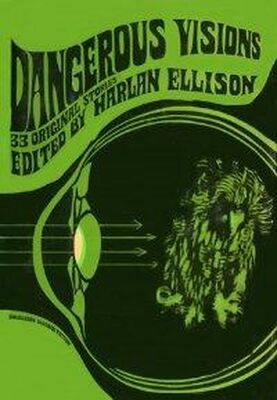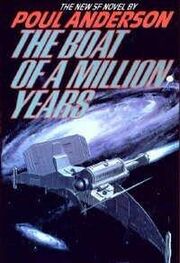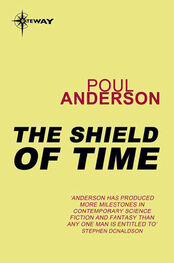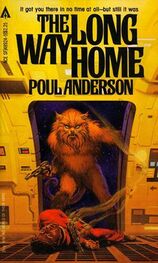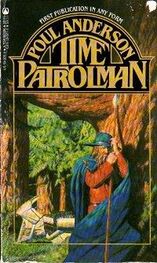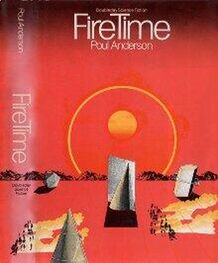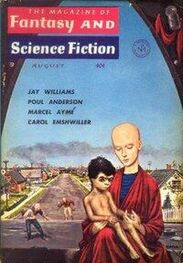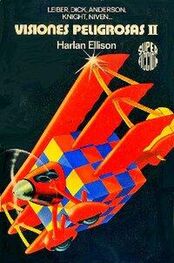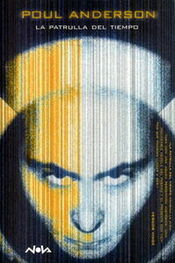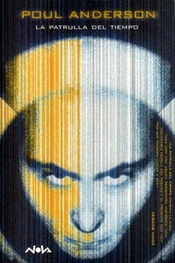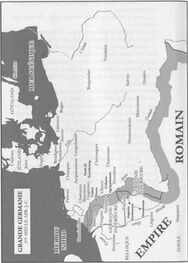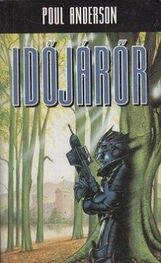Realization came, dimly, that he had left the pine forest and was in a second growth of beeches. Light gilded their leaves and caressed the slim white trunks. And what was that growl up ahead?
He stopped. A portal might remain. He had driven himself near collapse; but the organism has a reserve which the fully integrated man may call upon. From consciousness he abolished the sound of dogs, every ache and exhaustion. He drew breath after breath of air, noting its calm and purity, visualizing the oxygen atoms that poured through his starved tissues. He made the heartbeat quit racketing, go over to a deep slow pulse; he tensed and relaxed muscles until each functioned smoothly again; pain ceased to feed on itself and died away; despair gave place to calm and calculation. He trod forth.
Plowlands rolled southward before him, their young grain vivid in the light that slanted gold from the west. Not far off stood a cluster of farm buildings, long, low, and peak-roofed. Chimney smoke stained heaven. But his eyes went first to the man closer by. The fellow was cultivating with a tractor. Though the dielectric motor had been invented in this world, its use had not yet spread this far north, and gasoline fumes caught at Jason’s nostrils. He had thought that stench one of the worst abominations in America—that hogpen they called Los Angeles!—but now it came to him clean and strong, for it was his hope.
The driver saw him, halted, and unshipped a rifle. Jason approached with palms held forward in token of peace. The driver relaxed. He was a typical Magyar: burly, high in the cheekbones, his beard braided, his tunic colorfully embroidered. So I did cross the border! Jason exulted. I’m out of Norland and into the Voivodate of Dakoty.
Before they sent him here, the anthropologists of the Parachronic Research Institute had of course given him an electrochemical inculcation in the principal languages of Westfall. (Pity they hadn’t been more thorough about teaching him the mores. But then, he had been hastily recruited for the Norland post after Megasthenes’ accidental death; and it was assumed that his experience in America gave him special qualifications for this history, which was also non-Alexandrine; and, to be sure, the whole object of missions like his was to learn just how societies on the different Earths did vary.) He formed the Ural-Altaic words with ease:
“Greeting to you. I come as a supplicant.”
The farmer sat quiet, tense, looking down on him and listening to the dogs far off in the forest. His rifle stayed ready. “Are you an outlaw?” he asked.
“Not in this realm, freeman.” (Still another name and concept for “citizen”!) “I was a peaceful trader from Homeland, visiting Lawman Ottar Thorkelsson in Ernvik. His anger fell upon me, so great that he broke sacred hospitality and sought the life of me, his guest. Now his hunters are on my trail. You hear them yonder.”
“Norlanders? But this is Dakoty.”
Jason nodded. He let his teeth show, in the grime and stubble of his face. “Right. They’ve entered your country without so much as a by-your-leave. If you stand idle, they’ll ride onto your freehold and slay me, who asks your help.”
The farmer hefted his gun. “How do I know you speak truth?”
“Take me to the Voivode,” Jason said. “Thus you keep both the law and your honor.” Very carefully, he unholstered his pistol and offered it butt foremost. “I am forever your debtor.”
Doubt, fear and anger pursued each other across the face of the man on the tractor. He did not take the weapon. Jason waited. If I’ve read him correctly, I’ve gained some hours of life. Perhaps more. That will depend on the Voivode. My whole chance lies in using their own barbarism—their division into petty states, their crazy idea of honor, their fetish of property and privacy—to harness them.
If 1 fail, then I shall die like a civilized man. That they cannot take away from me.
“The hounds have winded you. They’ll be here before we can escape,” said the Magyar uneasily.
Relief made Jason dizzy. He fought down the reaction and said:
“We can take care of them for a time. Let me have some gasoline.”
“Ah… thus!” The other man chuckled and jumped to earth. “Good thinking, stranger. And thanks, by the way. Life has been dull hereabouts for too many years.”
He had a spare can of fuel on his machine. They lugged it back along Jason’s trail for a considerable distance, dousing soil and trees. If that didn’t throw the pack off, nothing would.
“Now, hurry!” The Magyar led the way at a trot.
His farmstead was built around an open courtyard. Sweet scents of hay and livestock came from the barns. Several children ran forth to gape. The wife shooed them back inside, took her husband’s rifle, and mounted guard at the door with small change of expression.
Their house was solid, roomy, aesthetically pleasing if you could accept the unrestrained tapestries and painted pillars. Above the fireplace was a niche for a family altar. Though most people in Westfall had left myth long behind them, these peasants still seemed to adore the Triple God Odin-Attila-Maniton. But the man went to a sophisticated radiophone. “I don’t have an aircraft myself,” he said, “but I can get one.”
Jason sat down to wait. A girl neared him shyly with a beaker of beer and a slab of cheese on coarse dark bread. “Be you guest-holy,” she said.
“May my blood be yours,” Jason answered by rote. He managed to take the refreshment not quite like a wolf.
The farmer came back. “A few more minutes,” he said. “I am Arpad, son of Kalman.”
“Jason Philippou.” It seemed wrong to give a false name. The hand he clasped was hard and warm.
“What made you fall afoul of old Ottar?” Arpad inquired.
“I was lured,” Jason said bitterly. “Seeing how free the unwed women were-”
“Ah, indeed. They’re a lickerish lot, those Danskar. Nigh as shameless as Tyrkers.” Arpad got pipe and tobacco pouch off a shelf. “Smoke?”
“No, thank you.” We don’t degrade ourselves with drugs in Eutopla.
The hounds drew close. Their chant broke into confused yelps. Horns shrilled. Arpad stuffed his pipe as coolly as if this were a show. “How they must be swearing!” he grinned. “I’ll give the Danskar credit for being poets, also in their oaths. And brave men, to be sure. I was up that way ten years back, when Voivode Bela sent people to help them after the floods they’d suffered. I saw them laugh as they fought the wild water. And then, their sort gave us a hard time in the old wars.”
“Do you think there will ever be wars again?” Jason asked. Mostly he wanted to avoid speaking further of his troubles. He wasn’t sure how his host might react.
“Not in Westfall. Too much work to do. If young blood isn’t cooled enough by a duel now and then, why, there’re wars to hire out for, among the barbarians overseas. Or else the planets. My oldest boy champs to go there.”
Jason recalled that several realms further south were pooling their resources for astronautical work. Being approximately at the technological level of the American history, and not required to maintain huge military or social programs, they had put a base on the moon and sent expeditions to Ares. In time, he supposed, they would do what the Hellenes had done a thousand years ago, and make Aphrodite into a new Earth. But would they have a true civilization—be rational men in a rationally planned society—by then? Wearily, he doubted it.
A roar outside brought Arpad to his feet. “There’s your wagon,” he said. “Best you go. Red Horse will fly you to Varady.”
“The Danskar will surely come here soon,” Jason worried.
Читать дальше